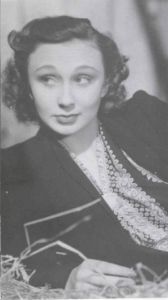Submitted by:
Tipu
Whatever became of ... Googie Withers
From: Whatever became of ...
All new, tenth series
By: Richard Lamparski, 1986

| In the United States Googie Withers is probably best known for her appearance in The Haunted Mirror sequence of the episodic thriller Dead of Night (1946) and in a smaller role in Hitchcock's The Lady Vanishes (1938). |
|
The English star was born Georgette Lizette Withers in Karachi, India. Her birth date is March 12, 1917. "Googie" is a term of affection and means "pigeon" in Hindi [never heard of this Hindi word - Tipu]. She remained in India with her mother, who was of Dutch- French-German descent, and her father, a British naval officer, until she was sent to boarding school in England at age seven.
Her father indulged her in dancing lessons, believing she would soon get over her interest in the theatre. "But," said Googie, "suddenly I was a very good dancer and they just had to take me seriously."
She was seventeen and dancing in a West End show when someone at a film studio spotted her and, feeling she showed potential, gave her a contract. She made quickies such as The Love Test (1934) with Louis Hayward and All at Sea ( 1935) with Rex Harrison.
She supported Dolores Del Rio in Accused (1936), was with Ann Todd in Action for Slander (1937), and in Paradise for Two (1937) with Patricia Ellis, Kate Plus Ten (1938) with Genevieve Tobin, Murder in Soho (1938) with the late Jack LaRue, She Couldn't Say No (1939) with Greta Gynt, Busman's Honeymoon (1940) with Constance Cummings, One of Our Aircraft is Missing (1942), which drew two Oscar nominations, and On Approval (1944) with Bea Lillie.
Pink String and Sealing Wax (1945) with Sally Ann Howes was a major hit in England. The grim but powerful It Always Rains On Sunday (1947) was one of the best British films of all time. Miranda (1948) with David Tomlinson was another box office success. Googie starred in all these, as well as in the Jules Dassin thriller Night and the City (1950). She was also one of many stars in The Magic Box (1951).
She believes the turning point in her career came when she was offered the lead in J. B. Priestley's They Came to a City. Since it was a drama it was thought the name "Googie" was unsuitable. She adamantly refused to change it, but was cast in the play anyway. After a two-year run in the West End during the Blitz, she played in it at Allied troop installations throughout Great Britain and starred in the 1944 movie version.
Her television series Within These Walls ran for two years in England, but was not seen in the United States. Based on fact, Googie portrayed the warden of a high-security women's prison.
In 1958 Googie moved with her husband, John McCallum, to Australia where for years he managed the country's largest chain of theatres. Skippy, the television series he wrote, directed, and produced in Australia, has been shown in eighty-nine countries.
Her last Broadway appearance was in The Complaisant Lover (1961) with the late Michael Redgrave. She played "Queen Gertrude" to his "Hamlet" at Stratford. In 1984 Googie and her husband did School for Scandal on a government-sponsored tour of ten countries.
She starred in the Australian movie The Nickel Queen (1971) and frequently tours their country and New Zealand in plays opposite her husband.
Bert Newton, Australia's top television and radio personality, said of Googie: "Her name on a theatre billboard is a guarantee of success in not only the major capital cities but anywhere there is a theatre. She is considered here one of our very own."
Because of the great distance and personal commitments, she has lost out on important roles on a number of occasions. Peter Hall wanted to present her in Cleopatra at Stratford-On-Avon, but, as Googie puts it, "my family needed me." She could have done the Rosalind Russell role in Wonderful Town in London, but again could not get away.
There were two movie roles for which she was considered and wanted to do. After she tested for A Yank at Oxford her agent told her it was hers, but Vivien Leigh played it. Googie took over the lead in Terence Rattigan's The Deep Blue Sea from Peggy Ashcroft in the West End and won an award when she recreated the character on English television. She was approached about doing the screen version but it, too, went to Vivien Leigh. "I really did feel cross about that one," the actress said in 1985. "The woman was no beauty and never had been. Vivien was still lovely, so the film really made no sense."
The one role she still longs to do is the part Gladys Cooper created in The Chalk Garden.
In recent seasons television viewers in the United Kingdom have seen Googie Withers as the subject of This Is Your Life and in the made-for-television movies Hotel du Lac and Time After Time. In the latter, in which she plays a seventy-five-year-old blind woman, she worked with her husband and her actress daughter Joanna Withers. [Usually known as Joanna McCallum]
Back to
Reviews


